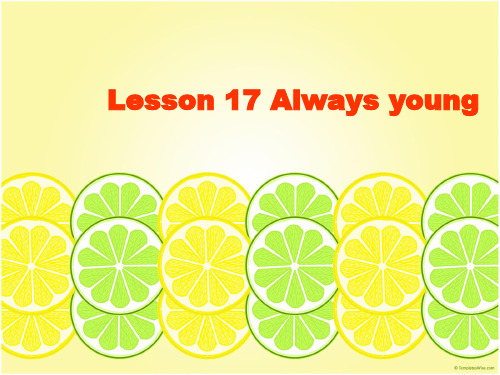新概念英语二讲义17-18
- 格式:doc
- 大小:39.50 KB
- 文档页数:2

【导语】新概念英语作为⼀套世界闻名的英语教程,以其全新的教学理念,有趣的课⽂内容和全⾯的技能训练,深受⼴⼤英语学习者的欢迎和喜爱。
为了⽅便同学们的学习,为⼤家整理了⾯的新概念第⼆册课⽂翻译及学习笔记,希望为⼤家的新概念英语学习提供帮助!《新概念英语》第⼆册第16课 A polite request 彬彬有礼的要求【课⽂】First listen and then answer the question.听录⾳,然后回答以下问题。
What was the polite request?If you park your car in the wrong place, a traffic policeman will soon find it. You will be very lucky if he lets you go without a ticket. However, this does not always happen. Traffic police are sometimes very polite. During a holiday in Sweden, I found this note on my car: 'sir, we welcome you to our city. This is a "No Parking" area. You will enjoy your stay here if you pay attention to our street signs. This note is only a reminder.' If you receive a request like this, you cannot fail to obey it!【课⽂翻译】⼀旦你把汽车停错了地⽅,交通警很快就会发现。
如果他没给你罚单就放你⾛了,算你⾛运。



Lesson 18 He often does this!阅读理解1. What had happened to the writer’s bag?The writer’s bag had been taken into the garden by the dog.2. Where had the writer left her bag?She had left it on a chair beside the door.单词详解1. pub n.小酒店近义词:bar文化背景:访问英国的人会发现传统英国酒吧是最能领略当地文化的地方。
但对于初来乍到的异国人来说,这些友善的酒吧却犹如潜藏着有惹事危险的"地雷区"。
一位人类学家和一组研究人员揭示了某些鲜为人知的英国酒吧文化。
人们首先遇到的困难是从买酒开始的。
大多数英国酒吧都没有酒保,你得到吧台去买酒。
这听上去似乎让人觉得不方便,可却有它深刻的内涵。
在因其冷漠而出名的英国社会里,酒吧文化的形成是为了促进社会交往。
排队的时候可以和其他等待买酒的人交谈。
在英伦诸岛上,和陌生人亲切地交谈被认为是完全适宜的正常行为的唯一场所可能就是吧台了。
“你如果没去过酒吧,那就等于没有到过英国。
"这对那些想要领略"英国生活和文化核心部分"的人是一种行为准则。
酒吧主要有以下几种形式:主酒吧(main bar),服务酒吧(service bar),宴会酒吧(banquet bar),绅士酒吧(gentleman bar),会员制酒吧(club bar),鸡尾酒廊(cocktail lounge),酒馆(tavern)。
2. landlord n.店主n.房东(女房东:landlady)n.地主The landlords had to give up their lands in 1940’s.3. billn. 账单为晚饭付账:pay the bill for the suppergas bill 煤气账单n. 法案the Bill of Rights (美国的)权利法案课文解析He often does this!1.After I had had lunch at a village pub, I looked for my bag.●注意复习时态:过去的过去用过去完成时,单纯表示过去发生的事用一般过去时●have的多种用法(详见语法重点)2.I had left it on a chair beside the door and now it wasn’t there!●leave “把(人、物)留下”、“遗留”、“丢下”The dog has left your bag by a tree. (把包丢在树旁边)Have you left the purse at home? (把皮夹子忘在家里)●比较beside与besides①beside prep. 在……旁边,在……附近②besides prep. 除……之外(还)③besides adv. 而且,并且,此外选词填空并翻译句子:I’m quite busy today. Besides, I’ve got a bad cold.我今天很忙,而且我还重感冒了。

Lesson18单词讲解ndlord n.店主,房东,业主,老板landowner n.2.bill n.账单,单据,清单/钞票/法案/广告pay the billUS dollar billsa crime billa bill boardLesson18课文&语法讲解本课重点:have的用法实义动词助动词have的用法实义动词1.“有”2.“吃喝玩乐做”助动词have的用法实义动词1.“有”I have a book.She has a car.He had a surprise.2.“吃喝玩乐做”have a meal have breakfast have some water have fun have a good timehave a swimhave的用法实义动词助动词(完成时态中)I have received a letter.She has bought a gift.He had left.have的用法(用法不同,变否定疑问也不同)实义动词助动词(完成时态中)I have received a letter.I have not received a letter.She has bought a gift.She has not bought a gift.He had left.He had not left.have的用法(用法不同,变否定疑问也不同)实义动词I have a book.I do not have a book. She has lunch.She does not have lunch. He had a good time.He did not have a good time.助动词(完成时态中)have的用法(用法不同,变否定疑问也不同)实义动词I have a book.I do not have a book. She has lunch.She does not have lunch. He had a good time.He did not have a good time.助动词(完成时态中)I have received a letter.I have not received a letter.She has bought a gift.She has not bought a gift.He had left.He had not left.have的用法练习:(判断用法,并变否定疑问)1.You have a lot of money.2.They had a swim yesterday.3.She has eaten breakfast.4.My dog had taken it into the garden.have的用法练习:(判断用法,并变否定疑问)1.You have a lot of money.2.They had a swim yesterday.3.She has eaten breakfast.4.My dog had taken it into the garden.have的用法练习:(判断用法,并变否定疑问)1.You have a lot of money.You do not have a lot of money.2.They had a swim yesterday.They did not have a swim yesterday.3.She has eaten breakfast.She has not eaten breakfast.4.My dog had taken it into the garden.My dog had not taken it into the garden.have的用法补充两点:“有”have=have got实义动词助动词You have a lot of money.=You have got a lot of money.do not have have not got have的用法补充两点:1.“有”have=have got2.have/has had had hadI had had lunch at a village.We have had trouble with the plan.It has had no effect.1.After I had had lunch…,I looked for my bag.have的过去完成时一般过去时先后2.I had left it on a chair beside the door and now it wasn’t there!beside the doorBesides this book,I have some others.3.As I was looking for it,the landlord came in.4.“Did you have a good meal?”he asked.5.“but I can’t pay the bill.I haven’t got my bag.”6.My dog had taken it into the garden.本课重点:have的用法实义动词助动词Lesson18知识拓展本课重点:if真实条件句(假设将来)Lesson18知识拓展本课重点:have的用法实义动词助动词have的用法实义动词“有”“吃喝玩乐做”助动词(完成时态中)have的用法He had a smoke after dinner.My friend Bill has had a headache.have的用法Their guest room has two big windows.We had had a long vacation after that.本课重点:have的用法实义动词助动词。

新概念英语第二册第17课(共5篇)第一篇:新概念英语第二册第17课Lesson 17 Always young 青春常驻My aunt Jennifer is an actress.She must be at least thirty-five years old.In spite of this, she often appears on the stage as a young girl.Jennifer will have to take part in a new play soon.This time, she will be a girl of seventeen.In the play, she must appear in a bright red dress and long black st year in another play, she had to wear short socks and a bright, orange-coloured dress.If anyone ever asks her how old she is, she always answers, 'Darling, it must be terrible to be grown up!' New words and expressions 生词和短语appear v.登场,扮演stage n.舞台 bright adj.鲜艳的 stocking n.(女用)长筒袜 sock n.短袜参考译文我的姑姑詹妮弗是位演员,她至少也有35岁了。
尽管如此,她却常在舞台上扮演小姑娘。
詹妮弗很快又要参加一个新剧的演出。
这一次,她将扮演一个17岁的少女。
演出时她必须穿一条鲜红色的裙子和黑色的长筒袜。
去年在演另一个剧时,她不得不穿短袜和一件鲜艳的橘红色的衣服。
一旦有人问起她有多大年纪,她总是回答:“亲爱的,长成大人真可怕啊!”1.Always young 青春常驻1)always [ˈɔ:lweiz] adv.1.at all times;on every occasion总是;每次都是: e.g.她每次都是7:30到。
新概念英语第二册Lesson 18He often does this!他经常干这种事!After I had had lunch at a village pub, I looked for my bag. I had left it on a chair beside the door and now it wasnt there! As I was looking for it, the landlord came in. "Did you have a good meal?" he asked. "Yes, thank you, "I answered," but I cant pay the bill. I haven‘t got my bag." The landlord smiled and immediately went out. In a few minutes he returned with my bag and gave it back to me."I’m very sorry," he said. “ My dog had taken it into the garden. He often does this!”【课文翻译】After I had had lunch at a village pub, I looked for my bag.我在一家乡村小酒店吃过午饭后,就找我的提包。
I had left it on a chair beside the door and now it wasnt there!我曾把它放在门边的椅子上,可这会儿不见了!As I was looking for it, the landlord came in.当我正在寻找时,酒店老板走了进来。
Did you have a good meal?" he asked.“您吃得好吗?”他问。
Lesson 17 Always young Vocabulary
1. appear v. 登场,扮演
appear:显示,露面
≠disappear(都是不及物动词)
The plane disappeared.
The plane appeared.
appear on the stage as... 扮演...角色
Eg: My aunt appeared on the stage as young girl.
appear:露面,显得He appears nervous.
2. stage n. 舞台
on the stage:在舞台上
in the stage:在某一阶段
3. bright adj. 鲜艳的
bright red:鲜红色
bright yellow:明黄色
bright blue:宝蓝色
4. stocking n. (女用)长筒袜
sock n. 短袜
Text
1. actress:女演员actor:男演员
以-or,-er结尾的,是男性
以-ress结尾的,是女性
Eg: waiter:男服务员waitress:女服务员prince:王子princess:公主
god:神God:上帝goddess:女神
lion:公狮子lioness:母狮子
doctor:男医生woman doctor:女医生2. must be
must + 动词原形:"不得不,必须:(对现在的)推测"
least: little的最高级"至少,最少"
at most……"最多"
eg: She is fifteen years old.
She must be fifteen years old.
She must be at most fifteen years old.
She must be at least fifteen years old.
She must be a model.
3. in spite of:尽管
in spite of this:尽管如此
in spite of this, I still like school.
4. join:参加了某一种团体
take part in :参加某一种活动
attend:出席
join the army:参军
join us:(口)加入我们中来
attend meeting:参加会议,出席会议
5. a girl of seventeen
She is eighteen years old.
She is a girl of eighteen.
She is a old man of sixty.
6. must do:必须做=have to; 推测
7.in…(介词)穿着...样的衣服(+颜色、衣
服)
用介词短语取代动词,避免了一句话中出现两个动词
the boy in green.
in a bright red dress:鲜红色的连衣裙
8. ever==at any time:任何时候(时间副词)
9. grown up:(形容词短语)成年人
grow up:(人)成长
be a grown-up:作为一个成年人
Key structures——Must用法
must+原形
(1)=have to"不得不,必须"
(2)(对现在的)推测
在过去时的句子中,要用have to 来表示"必须"have to……可以有任意时态
eg: She will have to... She had to...
She has to... She has/I have had to...
have to……作为实义动词,
否定式为:don't have to
will not have to didn't have to
对现在的推测:must do
对过去的推测:must have done
在I think, he thinks...的从句中,一定要用事实说话。
in one's opinion=I think"就某人看来"Special difficulties
1. as:
as a young girl...(介词)"作为"
as I learned,...(代词)"正如"
as I am busy==because"由于"
as I was leaving the house...==when"当...时"
Do as you are told. as……方式状语从句的引导词
I work as..."作为...工作"
Lesson 18 He often does this! Text
I had left it on a chair beside the door and now it wasn't there!
leave 除了“离去,离开,出发”的意思,还可以表示“把(人、物)留下,遗留,丢下”等。
Have you left anything in the car?
Key structure ——have用法
1.have 作为助动词构成各种完成时和完成进行时
2.have 还可以作完全动词,当作“具有、拥有”讲时,它和have got 通常可以互换。
have 做“有, 患病” 概念时, 可作为实义动词, 也可作为非实义动词。
在英国英语中的疑问句和否定句中have(具有)的用法与be 相同,即可以不用助动词do 或did;在美国英语中,常用do 助动词和have 一起构成疑问句和否定句。
I don’t have a pen/a headache.
I haven’t a pen /a headache.
3.have 作完全动词时,还可以表示eat,drink,enjoy,take 等意思,这时它是行为动词,可以用于包括进行时的各种时态。
当have 用于表示这些含义时,它必须与助动词do 等连用以构成疑问句或否定句。
have dinner, have a cigarette, have coffee, have a holiday, have a good time
have a swim, have a rest
have a pen, have a headache
3.三种情况have 可以用have got 取代
I have / have got a pen. “有”
I have / have got a headache. “得病”
have to = have got to
have 作“具有,拥有”讲时是状态动词,不能用于进行时态或被动语态,通常用于一般现在时。
在其它时态中,一般用have 而不用have got。
You can have these apples if you want them. I’ve got a lot more.
如果你想要这些苹果你可以把它们拿走。
我还有许多。
Special difficulties
1.give 的几个固定搭配
give 常用含义是“给予,交给”
gave away 赠送
He gave away all his books to the library.
give in 上交,呈交;屈服,让步,投降Give in your examination papers after you’ve finished.
You can do what you like. I will never give in. give up doing sth. 放弃,抛弃
He gave up drinking a few years ago.
give up 交出,让出
Jack has given up the watch he stole last week. Three of our officers gave themselves up to the enemy. 我方的三名军官向敌人投降了。
2.Beside and Besides
beside pron. 在……旁边,在……附近Come and sit beside us.
besides a dv. 而且,并且,此外;pron. 除……之外(还)
She has so much else to do besides. 此外,她还有许多其他事要做。
I’m quite busy today. Besides, I’ve go t a bad cold. There were a lot of people at the party besides us.。